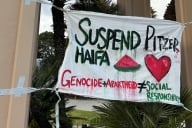You have /5 articles left.
Sign up for a free account or log in.
SAN FRANCISCO -- Virtually every major conference of higher education leaders in the last two years has had a session on the sexy and contentious topic of free speech, and the Association of Governing Boards of Universities and Colleges, meeting here this week, was no different.
What distinguished the panel here, if anything, may have been the high wattage of its participants -- moderator Frank Sesno, the former CNN anchor (and Middlebury College trustee), and as panelists the presidents of two institutions that have been the focus of some of the most visible confrontations and disputes in recent years, the University of Virginia and the University of California system.
Teresa Sullivan, the University of Virginia's president, Janet Napolitano, who heads the University of California, and their fellow panelists (a Dartmouth College lawyer, a University of Michigan trustee, and representative of the Foundation for Individual Rights in Education, a civil liberties group) didn't plow a lot of new ground in their fast-moving hourlong conversation.
But given that free speech issues continue to vex college campuses, as evidenced just this month by disputes over a professor's social media statements about the late Barbara Bush, a faculty member's Twitter comments about Jewish students at a small private college, and yet another campus speaker shouted down, it's probably the case that the issues can't be discussed (and written about) too much.
In case you were wondering, no one came out against free speech in the discussion. To the contrary, the panelists took turns expressing their advocacy for the importance of free speech generally and the key role colleges and universities should play (if they aren't always successful) in modeling free expression and educating tomorrow's citizens and civic leaders how to participate in a democracy.
"I believe that universities are institutions that should embody the highest values of free speech. Once you start dictating what kinds of speech and content of speech you allow, you are quickly on a slippery slope," said Napolitano. Many of today's students "have grown up having been educated against bullying and bullying speech, and haven’t been necessarily exposed to rigor of what free speech means, and that it’s not always comfortable speech."
One key role higher education institutions can play, she said in discussing a new center the university has created to study and advocate for free speech and civic engagement, is to help understand "where do students of today get their views of the First Amendment, where do they derive their values, how do we best educate the next generation about free speech, and how it’s been used in the past" -- not "as a tool of the alt-right," as it often is today, "but as a tool of the civil rights movement, women’s rights movement."
Shauna Ryder Diggs, a regent at the University of Michigan, said that many of today's young people see the First Amendment as "favoring white supremacists" and others hostile to minority students of various types. She described how as a young black woman her parents told her about how religious leaders in Montgomery, Ala., sought to block Martin Luther King Jr. from speaking there because of fears his appearance would incite violence.
When Richard Spencer -- "the person who shall not be named," she called him -- sought to speak at Michigan this spring, Diggs found herself arguing for letting him speak, prompting someone to call her a "white supremacist/Nazi sympathizer" on Twitter. (Spencer ultimately did not speak at Michigan after he and university administrators could not agree on a date and location for him to appear.)
William Creeley, senior vice president of legal and public advocacy at FIRE, noted that "no party or ideological base has control" over the free speech mantle. Citing this month's furor over a California State University at Fresno faculty member's Twitter comments about Barbara Bush, he pointed out that "the same people who have been calling students snowflakes [for condemning speech that insults them] are now saying, 'Fire that professor.'"
College leaders often find themselves satisfying no one, said Sullivan of Virginia. While she, of course, discussed the still-stunning situation that the university found itself in when white supremacists took over the campus last year, she spoke more directly about a more recent incident in which Muslim and other students shouted down a speaker at a pro-Israel event sponsored by Jewish students at the university.
Minority students criticized the university for having the protesters escorted from the meeting by police officers, and free speech advocates have complained that the university has not identified the students or revealed what punishments they've received through the student judiciary process.
"I figure if I'm getting attacked from both sides," Sullivan said, "I'm probably about where I ought to be."









